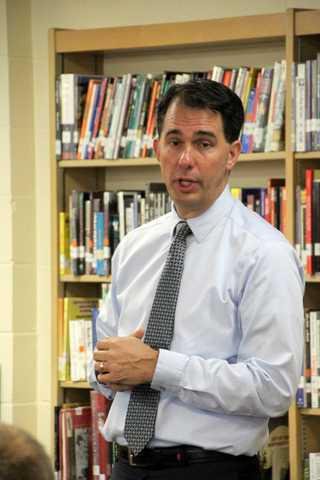CUBA CITY—Technology gets a boost in rural schools this year and next as $9 million has been allocated in the Wisconsin state budget each year to improve technology infrastructure.
The Technology for Educational Achievement (TEACH) grants allow schools to enhance the role of information technology in student learning and achievement. State Superintendent of Schools Tony Evers, Department of Administration Secretary Cate Zeuske and Governor Scott Walker visited schools in Door County and Cuba City on Tuesday to reinforce their commitment to the grant.
The 2015 Wisconsin Act 55 allocated $7.5 million annually for the TEACH Information Technology Infrastructure Grants and an additional $1.5 million for technology training for teachers.
“What it really all boils around is trying to make sure that all throughout the state, particularly in our schools, we have the best technology possible,” Walker said. “One of the most common things I hear about is Internet access, particularly in rural parts of the state. Our goal over the next year or so is to help make sure that every part of the state has access to high-speed Internet connections. First and foremost, we want to make sure that we continue to advance it here in our schools.”
The grants are administered by the Department of Administration in collaboration with the Department of Public Instruction and allow school districts to acquire the equipment and services necessary to build a modern infrastructure system in the school.
“It’s important to bring high-capacity Internet to all schools within our state,” Evers said. “It’s going to make things a lot better for the students. It’s not about the bells and whistles, it’s about making sure that the kids learn at a high level.”
Walker mentioned how State Representative Travis Tranel helped triple the amount of money the state put in to local broadband grant assistance. The initiative increased the bandwidth at schools through the BadgerNet Converged Network, a statewide telecommunications network, at no additional cost to the users.
“For us to cover every part of the state, including the most rural, be it farmland or forest land across the state, we are going to make a giant leap forward going into next year to really make sure that every part of the state, not just our schools, our technical colleges and our public buildings, but every part has access,” Walker said.
He said without high speed Internet, it’s hard for students to do homework, or citizens to do business, making it an important initiative to undertake.
“For our students, we want to make sure that you have access not just to the hardware, but to the best speeds possible,”
Walker said. “It’s really about investing in our students.”
The allocated funds can be used for infrastructure equipment and services such as access points, antennas, maintenance of internal connections, cabling, caching equipment and services, LAN controllers, routers, switches, UPS/battery back-up and wireless controllers. Grants will be awarded to schools that demonstrate readiness to use the purchased infrastructure.
Grants for both infrastructure and training for fiscal year 2017 are available to eligible school districts, those with 13 or fewer students per square mile in the participating school district. The amount of funding available to a school district is determined by the number of students within the district. Schools with fewer than 750 students are allocated $7,500; schools with 750-1,500 students are allocated $10 per student; and schools with more than 1,500 students are allocated $15,000. Schools need to apply for the grants this fall for 2017 funding.
“This is a step in the right direction,” Evers said. “This is not the end of our efforts to ensure that all school districts and public libraries across the state have adequate technology.”
For more information about the TEACH grants, go to www.teach.wisconsin.gov.





